Samsung Galaxy Note 3 Review
by Brian Klug on October 1, 2013 9:00 AM EST- Posted in
- Smartphones
- Samsung
- Mobile
- Android 4.3
- galaxy note 3
CPU Performance
The original Note I played with was based on Qualcomm’s APQ8060 platform with MDM9200 baseband (the so-called Fusion 2 platform) and was for its time a pretty awesome piece of kit, combining LTE and a dual core SoC. The Note 2 I played with next was based on Samsung’s own Exynos 4412 SoC with quad core Cortex A9 at 1.6 GHz and Mali–400MP4 GPU. For the Note 3, I’m looking at a T-Mobile variant (SM-N900T if you want to be exact about it) which means it includes a Snapdragon 800 SoC, and Samsung has gone for the 2.3 GHz bin (really 2.265 GHz rounded up). Inside are 4 Krait 400 CPUs running at up to 2.3 GHz, and Adreno 330 graphics at up to 450 MHz, all built on TSMC’s 28nm HPM HK-MG process.
I should note that this is MSM8974 and not MSM8974AB which oddly enough one of Qualcomm’s customers already announced (Xiaomi for the Mi3) which boosts GPU clocks up to 550 MHz and the LPDDR3 memory interface up to 933 MHz, among a few other changes. I’ve confirmed that GPU clocks on the Note 3 are indeed maxing out at 450 MHz, and quite honestly it’s a bit early for 8974AB in the first place, though it wouldn’t surprise me to see Samsung eventually get that faster bin at some point and put it in something.
I should mention that the Note 3 (like many other Android devices - SGS4, HTC One) detects certain benchmarks and ensures CPU frequencies are running at max while running them, rather than relying on the benchmark workload to organically drive DVFS to those frequencies. Max supported CPU frequency is never exceeded in this process, the platform simply primes itself for running those tests as soon as they're detected. The impact is likely small since most of these tests should drive CPU frequencies to their max state regardless (at least on the CPU side), but I'm going to make it a point to call out this behavior whenever I see it from now on. Make no mistake, this is cheating plain and simple. It's a stupid cheat that most Android OEMs seem to be ok with and honestly isn't worth the effort. Update: Of our CPU tests only AndEBench is affected exclusively by Samsung's optimizations, the performance gain appears to be around 4%. Vellamo is gamed by all of the Snapdragon 800 platforms we have here (ASUS, LG and Samsung). None of this is ok and we want it to stop, but I'm assuming it's not going to. In light of that we're working with all of the benchmark vendors we use to detect and disable any cheats as we find them. We have renamed versions of nearly all of our benchmarks and will have uniquely named versions of all future benchmarks we use. We'll be repopulating our Bench data where appropriate.
CPU performance is honestly excellent. The Galaxy Note 3 is more or less the fastest Android smartphone we've tested up to this point. In the situations where we can do cross platform (OS/browser) comparisons, it isn't quite as fast as the iPhone 5s but in some cases it comes close.
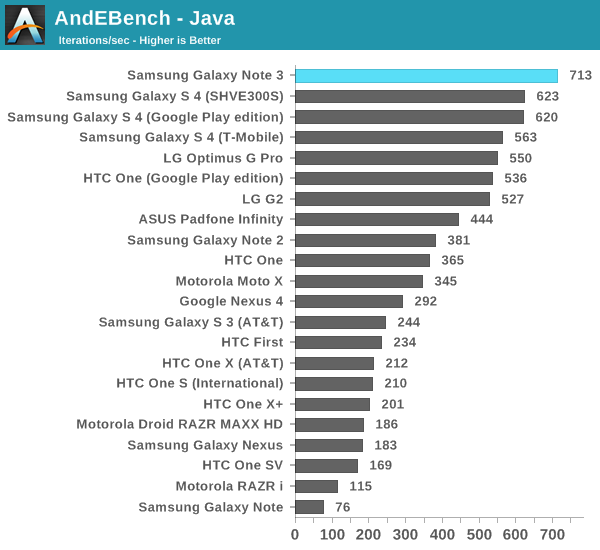
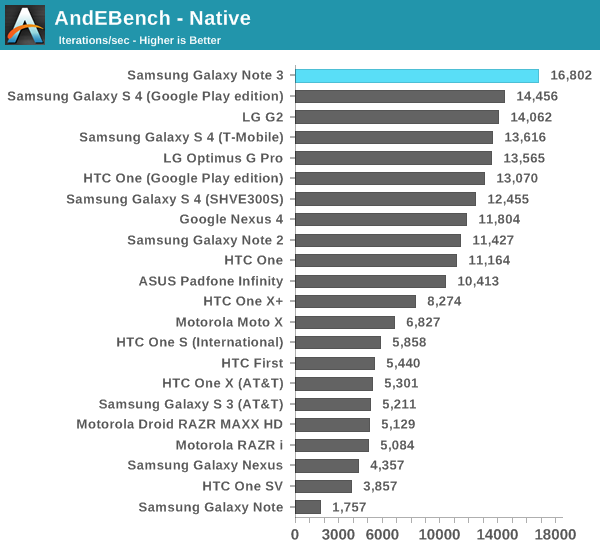
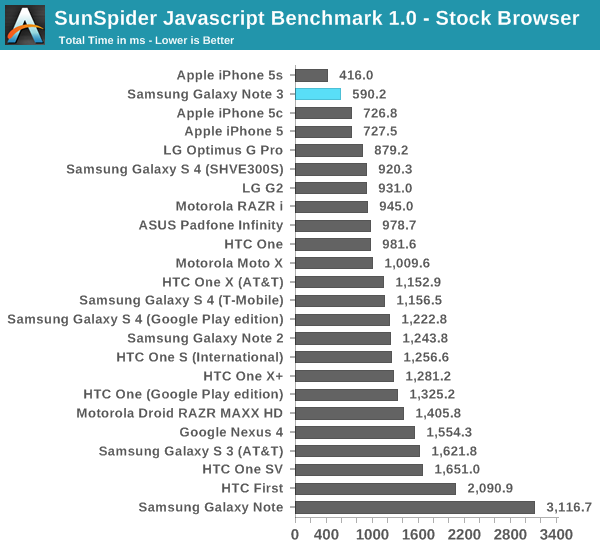
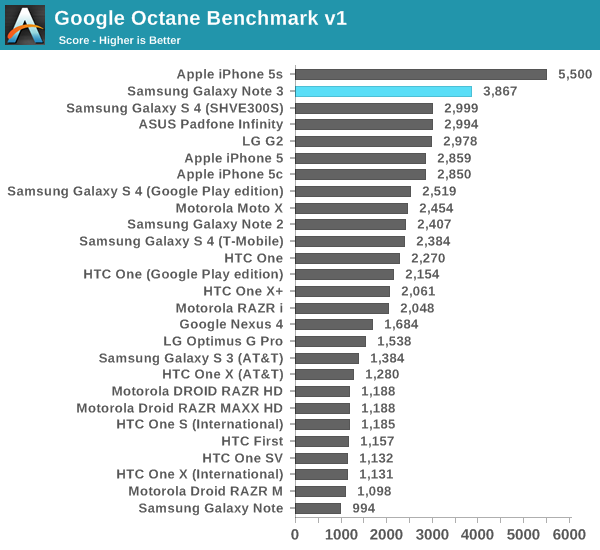
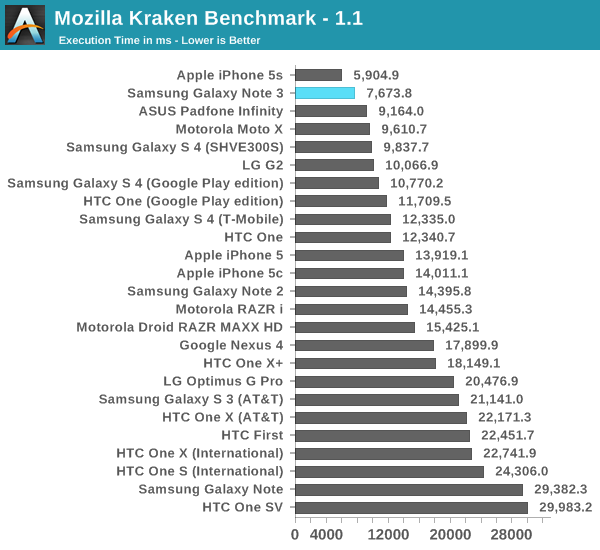
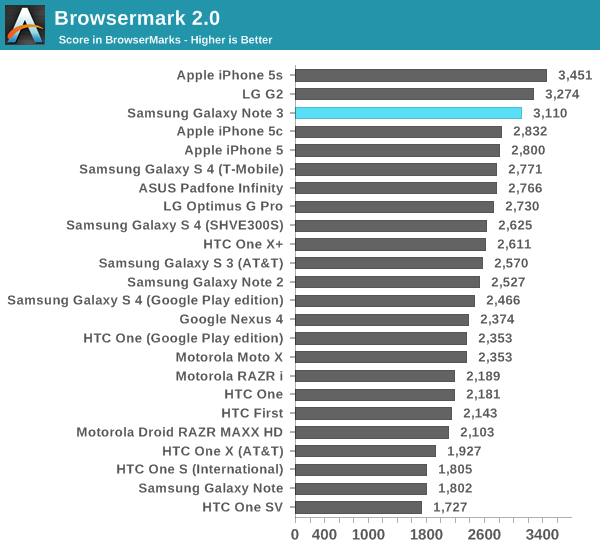
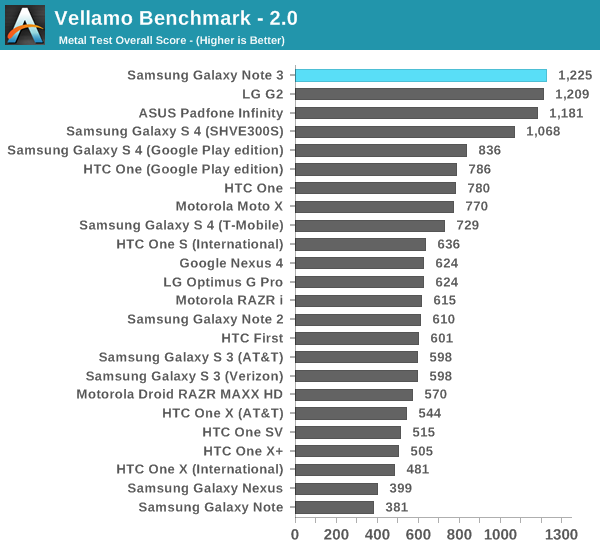
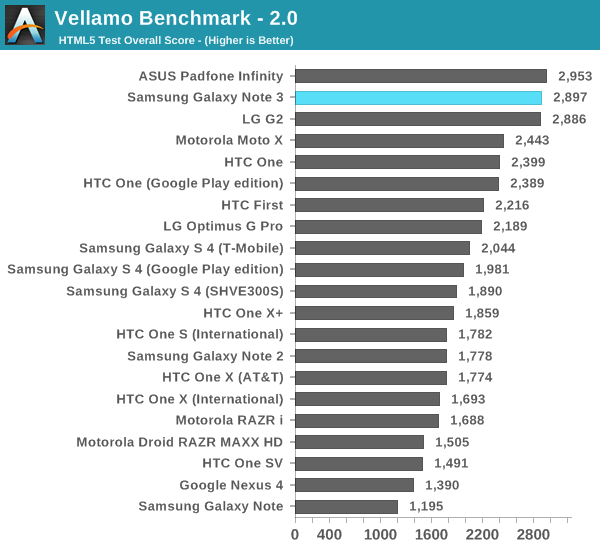
GPU Performance
Samsung definitely likes to win, and the Galaxy Note 3 walks away with the GPU performance crown in literally every single offscreen test we've got here. The onscreen tests are obviously governed by display resolution, but all things being equal the Note 3 manages to get the edge over the PowerVR G6430 in Apple's iPhone 5s. It's also interesting to note that the Galaxy Note 3 appears to outperform all other Snapdragon 800 smartphones we've tested thus far. There's a couple of potential explanations here. First, the Galaxy Note 3 is using newer drivers than any of the other S800 platforms we've tested:
Note 3: 04.03.00.125.077
Padfone: 04.02.02.050.116
G2: 4.02.02.050.141
Secondly, it's unclear how much the manual CPU DVFS setting upon benchmark launch is influencing things - although I suspect it's significant in the case of something like 3DMark.
Finally each manufacturer has the ability to define their own thermal limits/governor behavior, it could simply be that Samsung is a bit more aggressive on this front. We honestly haven't had enough time to dig into finding out exactly what's going on here (Samsung gave us less than a week to review 3 devices), but the end result are some incredibly quick scores for the Note 3. If I had to guess I'd assume it's actually a combination of all three vectors: drivers, high CPU frequencies and being more lenient with thermals.
Update: GFXBench 2.7 isn't affected by any optimizations here, but Basemark X and 3DMark are. We expect the Note 3's performance is inflated by somewhere in the 3 - 10% range. We're working on neutralizing this optimization across our entire suite.
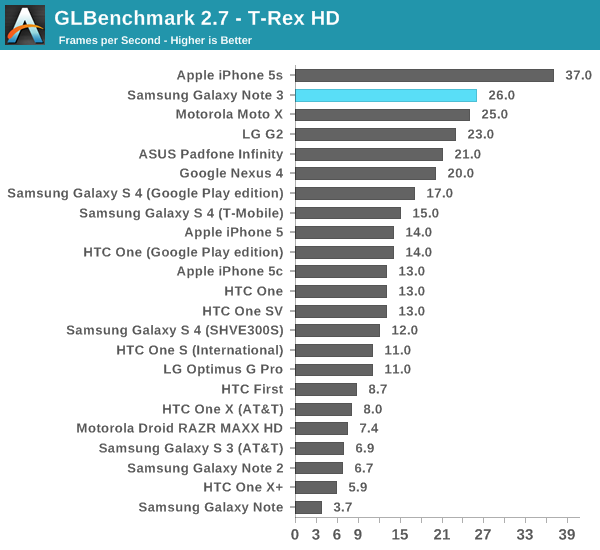
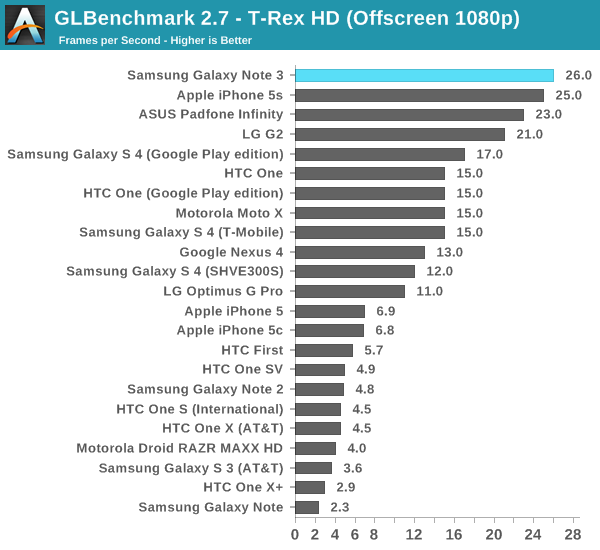
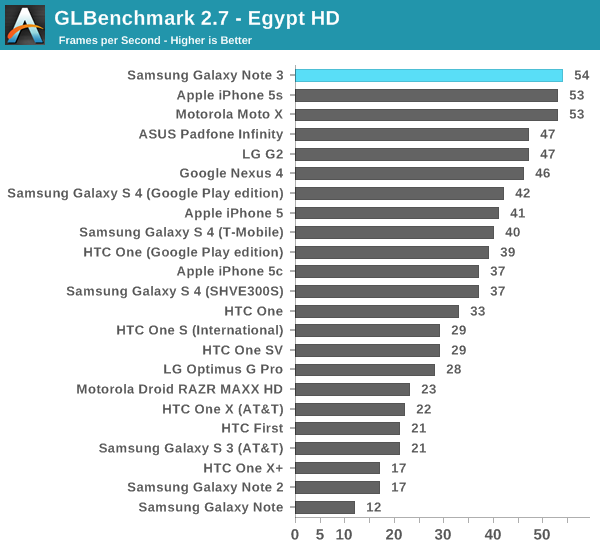
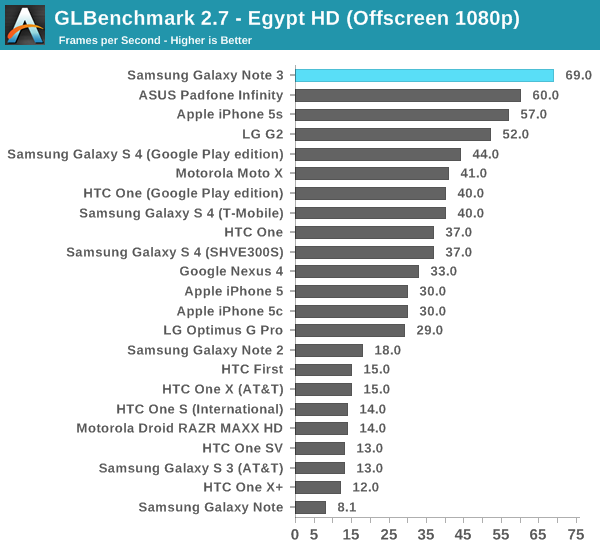
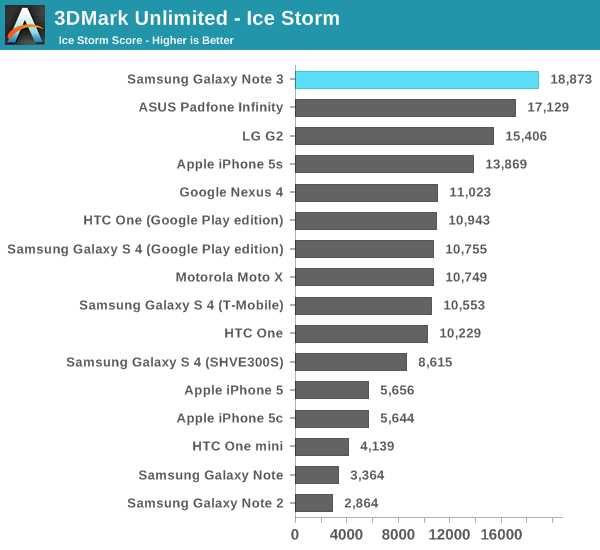
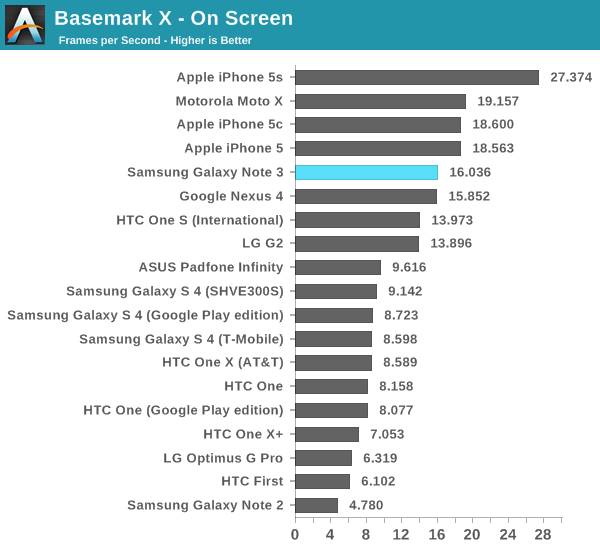
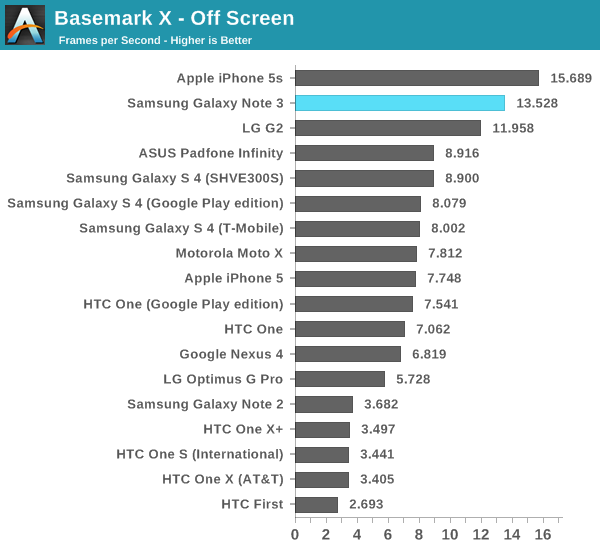
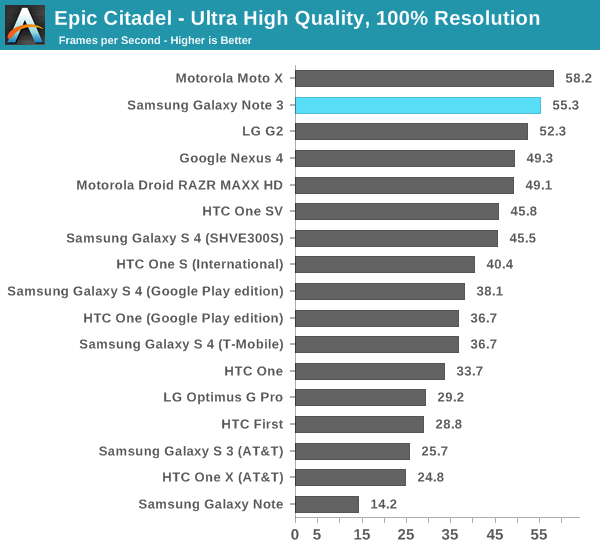
NAND & USB 3.0 Performance
Our Galaxy Note 3 review sample posted some incredible storage performance results, at least compared to all other Android smartphones we've tested. Sequential read and write performance are both class leading - the latter is nearly 2x better than the next fastest phone we've tested. Random read performance is decent, but it's random write performance that's surprising. Unlike the Moto X, the Galaxy Note 3 doesn't rely on a flash-friendly file system to get great random write performance - this is raw eMMC horsepower (if you can call ~600 IOPS that). The result isn't quite as good as what you get out of the Moto X, but it comes very close. Android 4.3 should bring FSTRIM support to the Galaxy Note 3, so as long as you remember to leave around 20% of your storage as free space you should enjoy relatively speedy IO regardless of what you do to the phone.
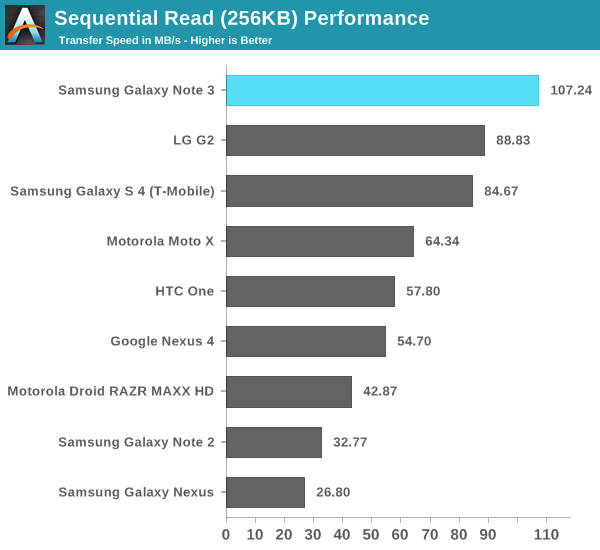
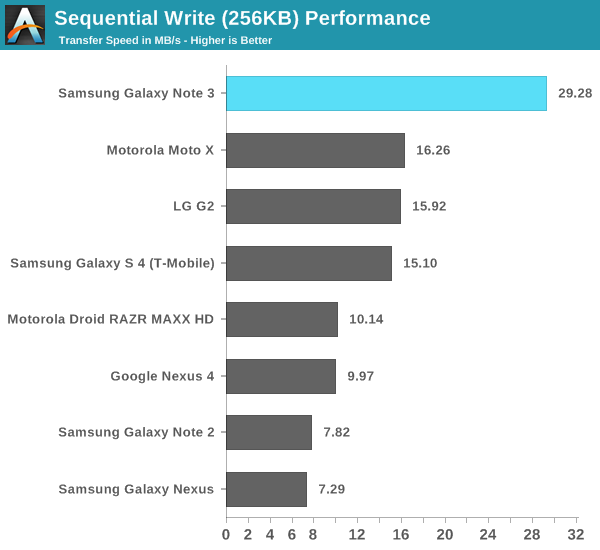
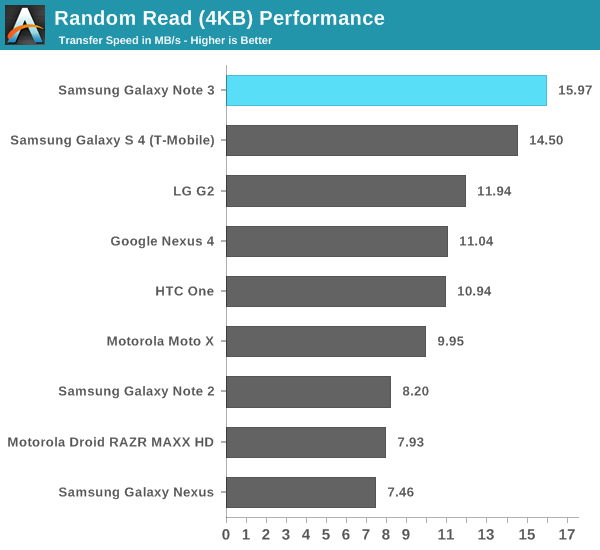
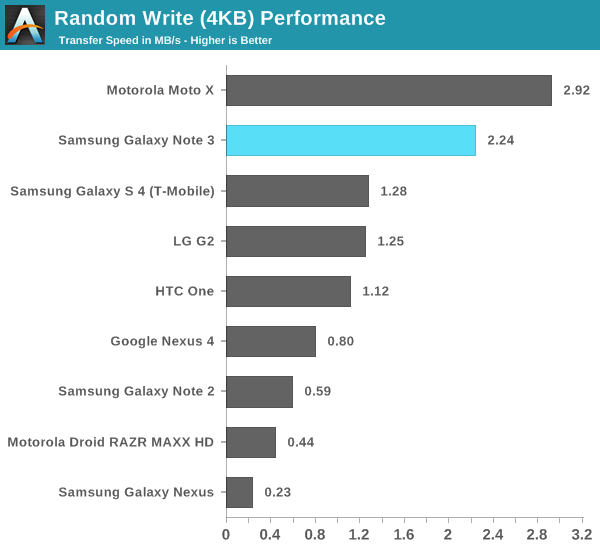
The Galaxy Note 3 ships with USB 3.0, unfortunately at least in its current state it doesn't seem to get any benefit from the interface. Although the internal eMMC is capable of being read from at ~100MB/s, sustained transfers from the device over adb averaged around 30MB/s regardless of whether or not I connected the Note 3 to a USB 2.0 or 3.0 host.
Update: USB 3.0 does work on the Note 3, but only when connected to a Windows PC with USB 3.0. Doing so brings up a new option in the "USB Computer Connection" picker with USB 3.0 as an option. Ticking this alerts you that using USB 3.0 might interfere with calls and data, but then switches over. Connection transfer speed is indeed faster in this mode as well, like you'd expect.
It only appears on Windows as well, my earlier attempts were on OS X where this popup option never appears.



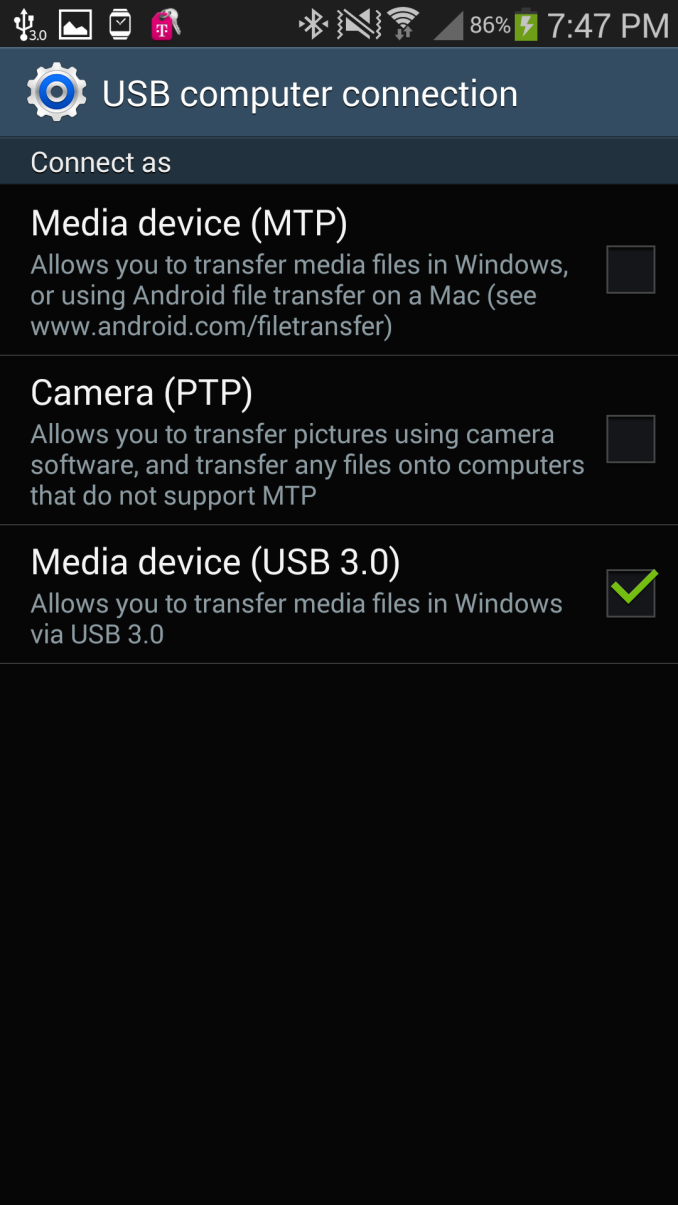
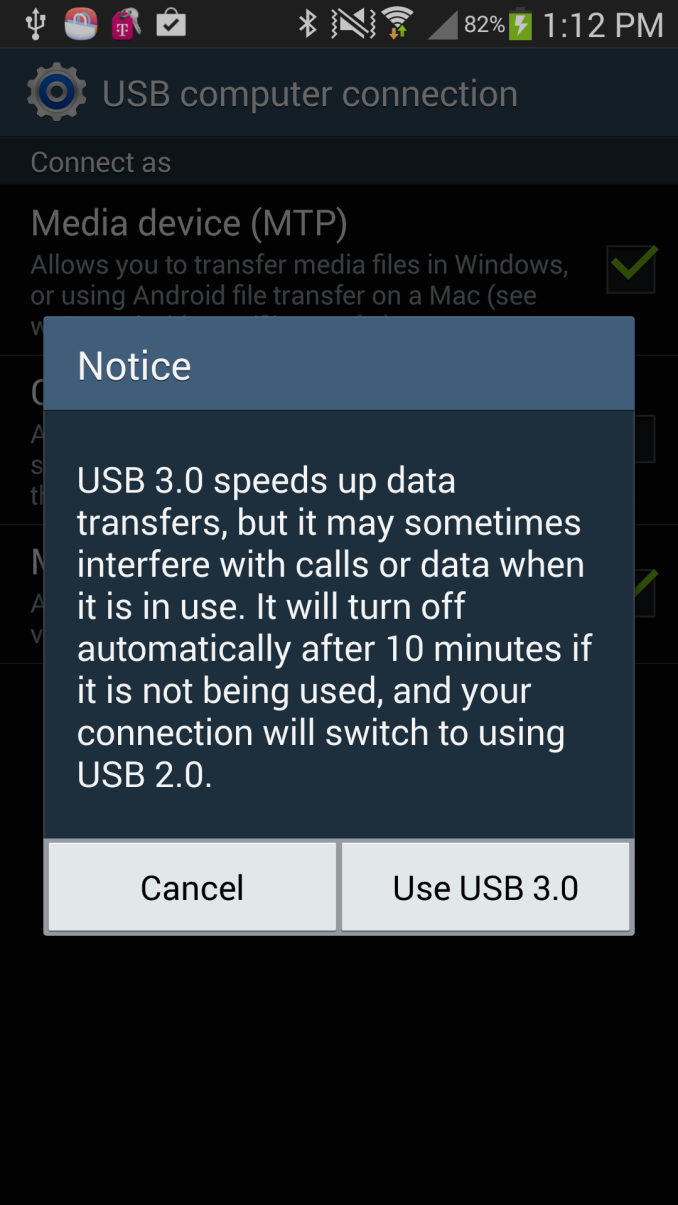








302 Comments
View All Comments
cupholder - Tuesday, October 1, 2013 - link
Why wouldn't they? They haven't been able to truly innovate since Jobs left, and no one in their right mind would actually believe at 1.3 dual core beats 2.3 quads in a whole lot.testcss - Tuesday, October 1, 2013 - link
Yeah, those 2.3 GHz Athlon X4s sure are faster than dual 1.3 GHz i7s.dugbug - Wednesday, October 2, 2013 - link
Huh no... samsung uses string matching to determine if the app is a benchmark app or not. Just create a suite of tools that use gibberish names.itpromike - Tuesday, October 1, 2013 - link
Anand, can we see the non-inflated benches for this device vs. the iPhone 5S?ciparis - Wednesday, October 2, 2013 - link
What stuck out to me was the speculation that the results were likely to be minor, while the Ars article demonstrated them to be anything but.This sort of cheating is far from new, but usually it is met with abject rejection. If you recall, when PC GPU vendors have been caught doing this, they were raked over the coals -- and it stopped, immediately. We have to hold these newcomers to competitive metrics to the same standards.
Spunjji - Tuesday, October 8, 2013 - link
Here, I shortened your comment:BLAH BLAH BLAH DIDN'T READ THE REVIEW BLAH.
Jumangi - Tuesday, October 1, 2013 - link
That's not a good enough answer Anand. Samsung and whoever else are blatantly cheating and you guys just post the false numbers in your reviews while basically saying "oh well they all do it". That's not good enough. Ars doesn't let it go at that and they show how they disabled the boosting to give real numbers. If you guys can't be bothered to do what's necessary to give your readers accurate info then why should people bother to come here?Talks - Saturday, October 12, 2013 - link
@Jumangi: "That's not a good enough answer Anand. Samsung and whoever else are blatantly cheating and you guys just post the false numbers in your reviews while basically saying "oh well they all do it". That's not good enough. Ars doesn't let it go at that and they show how they disabled the boosting to give real numbers. If you guys can't be bothered to do what's necessary to give your readers accurate info then why should people bother to come here?" oh really?!, then why are you here anyway! you, are just like the iPhone 5C that you are favoring with…, full of plastic!!! why can't you just humbly admit that by this time, Apple and its was once awesome iPhone now 5S, just like the first; and by far the truest of the true great innovator Nokia, has now being surpassed by the mighty Samsung! first in its Galaxy S3; S4; and now, the true awesome mighty Galaxy Note 3!!!akdj - Wednesday, February 5, 2014 - link
I'm not so sure I saw or read the same review as you....nor did I see the same charts. The n3 and 5s are top of the heap (I own both). The reviews of each are reflective of their performance. And these two absolutely SMOKE the S3,S4, ANY Nokia...as I believe do the year old 5--& 5c? You might wanna take another 'look'. And then think....if Apple didn't exist, would we have an S4? A Note 3? In their present form factor, speed and reliability, capability and Eco system (software and apps)? Or vice versa. No Android? We might still be playing with a 3GS and lacking LTE demand. Competition is awesome....for everyone. It keeps the innovation going....Apple's 5s is an absolutely unbelievable phone. As are the new iPad. The Note 3 is phenomenal. I. LOVE it. If half you bozos defending one company or the other would give the opposite a 'try' you might just see what the 'truth' is. So many strengths to both OSes. The flagships are mothas. Neither are anything but top shelf. The software and 'app' development community is behind both....but iOS tends to get 'some' types of apps faster, with better performance...and a significant 'choice' of whatever it is your interest is. OS updates on time. Significant resale value. Android on the flip side is amazing when it comes to 'power' user, business and professional work---tinkering, display size choice and customization....ICS completely changed the 'lag' while the hardware caught up. Both amazing systems. If justifiable, buy a pair:-). Everyone needs a 'bat-phone'!alovell83 - Tuesday, October 1, 2013 - link
I'm more disappointed in your battery charge time metric. We fully charge our phones at night, time until full isn't as important as 2 hours display and 10 hours standby, enough to get you through a night. Or how much life you can get from a 30 minute charge. That's the use-case.